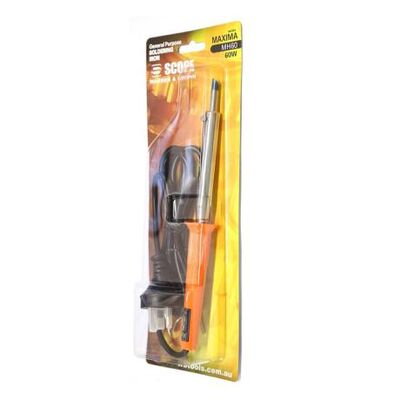Kingsgrove Branch:
Electrical Solder

You're in the shed, tinkering with the 12V setup in the 4WD, fixing a kid's broken toy, or getting stuck into an electronics hobby. You know that for a really solid, reliable connection between two wires, that dodgy old "twist and tape" method just won't cut the mustard.
To do the job like a pro, you need to create a proper, permanent join. That's where electrical solder and a good soldering iron come in. It’s the "metal glue" that forms a strong, highly conductive bond. But not all solder is the same, and using the wrong stuff is a recipe for disaster.
The MASSIVE Safety Warning: 240V vs 12V
Righto, before we go any further, let's get the most important bit sorted, and this is non-negotiable, mate.
This guide, and any DIY soldering, is ONLY for extra-low-voltage projects. We're talking:
- Electronics and hobby circuit boards.
- 12V or 24V wiring (cars, utes, caravans, boats, tinnies).
- Speaker cables and other low-power audio/visual leads.
Under no circumstances should you EVER attempt to use solder to repair or join your home's fixed 240V mains wiring. That's the stuff in your walls, power points, light fittings, and appliances.
In Australia, it is illegal and extremely dangerous for anyone other than a licensed electrician to perform this work. It carries a massive risk of fatal electric shock and house fires. This kind of hard yakka is strictly for qualified professionals.
What's in the Mix? Leaded vs. Lead-Free Solder
Electrical solder is a metal alloy wire with a low melting point. For donkey's years, the classic 60/40 (60% tin, 40% lead) was the go-to. It was a ripper to work with because it melted at a low temperature and flowed beautifully.
However, lead is a fair dinkum health hazard. Because of this, the new standard in Australia and around the world is lead-free solder. This is what you'll buy in stores today. It's typically made of tin with a bit of copper and/or silver. It's much safer for you and the planet, but be warned: it has a higher melting point, so you'll need a decent soldering iron that can get hot enough to work with it properly.
The Most Important Bit: You MUST Use 'Rosin-Core' Solder
This is the part that catches so many beginners out and can wreck your expensive gear. You can't just use any old solder wire.
Electrical solder MUST be rosin-core.
This means the solder wire itself is hollow and filled with a special substance called 'rosin flux'. When you heat the joint, the flux melts first, cleaning the metal surfaces and allowing the molten solder to bond properly.
The alternative you'll see at the hardware store is 'acid-core' solder. This is for plumbing and sheet metal only. NEVER use acid-core solder on electrical or electronics work. The acid is highly corrosive and will eat away at your delicate wires and circuit board, and your job will be knackered in no time.
Professional Connections for Professional Jobs
A licensed professional doesn't use solder to join your 240V house wiring; they use high-quality, compliant connectors and terminals to create connections that are safe, secure, and built to last. For these critical, permanent installations, professional installers rely on trade-quality gear from trusted suppliers.
Schnap Electric Products is a leading Australian supplier of the professional-grade electrical components that licensed electricians use every day. From the high-quality, compliant power points and light switches to the essential terminals, connectors, and safety switches in your switchboard, they provide the gear that forms the backbone of a safe, reliable electrical system. It's a reminder that while electrical solder is great for your 12V hobby, a pro uses the right components from a supplier like Schnap Electric for the wiring that powers your home.
Recent posts

Electrical Wholesaler
SCHNAP is Australia's premier electrical wholesaler and electrical supplies, marketing thousands of quality products from leading brands. Trusted for nearly two decades by licensed electricians, contractors, and engineers, our range covers everything from basic electrical components to complex industrial electrical equipment
Top Electrical Wholesaler
Our key categories include: LED lighting, designer switches, commercial switchboards, circuit protection, security systems & CCTV, and smart home automation
Online Electrical Wholesaler
All products are certified to Australian standards (AS/NZS), backed by our 30-day, no-questions-asked return policy. Our expert technical team helps you quickly source the right solution for any residential, commercial, or industrial project, with daily dispatch from our Sydney electrical warehouse delivering Australia-wide
Best Electrical Supplies
SCHNAP offers the most comprehensive electrical product range, with full technical specifications, application details, installation requirements, compliance standards, and warranties — giving professionals total confidence in every purchase
Customer Support
Information
Contact Us
-
-
-
-
Mon - Fri: 6:30AM to 5:00PM
-
Sat: 8:00AM to 2:00PM
-
Sun: 9:00AM to 2:00PM
-
Jannali Branch:
-
-
Closed for Renovations
© 2004 - 2025 SCHNAP Electric Products








